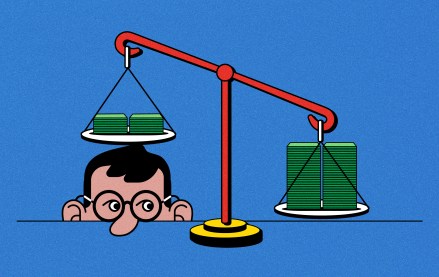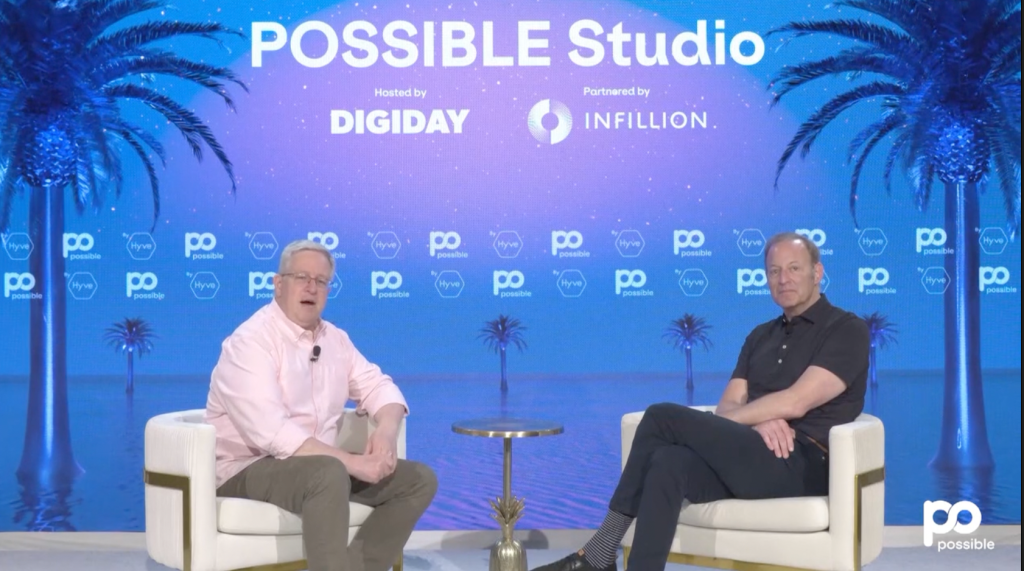Secure your place at the Digiday Publishing Summit in Vail, March 23-25
Economic uncertainty bubbles up in conversations on first day of Possible

Digiday is at Possible giving you the latest industry news out of the event in Miami. More from the series →
The only thing clear at the moment in forecasting economic conditions across the marketing ecosystem is that you pretty much can’t.
At least that’s the message being delivered by executives who swung by the Digiday Studio at the Possible conference on Day 1, which got underway in Miami on Monday.
Some speakers, including Zeta Global founder and CEO David Steinberg, were at least encouraged that marketers haven’t yet slashed their budgets, and are instead still holding in a wait-and-see pattern.
“Right now, everyone I’m talking to has changed nothing — I haven’t seen any cutbacks and I haven’t personally seen any pull-forwards,” said Steinberg. “From a marketing perspective, nobody I’ve talked to on the agency side has seen any cutbacks yet.”
Watch our video interview series by clicking below:
Santi Darmandrail, gm of Epsilon for Latin American and Canada, explained that the mood is hardly different in Latin America, but noted that many Latin American business leaders are used to economic instability and are somewhat less ruffled by current events affecting them. In Canada, meanwhile, where the Liberal Party candidate Mark Carney just won the national election to be its next prime minister, there’s a strong current of unity among companies in their mission to be less reliant on the U.S. for economic cooperation.
“Latin American and Canadian marketers are some of the most resilient in the world,” said Darmandrail, “because they’re not unused to economic turmoil be it for internal reasons or global reasons … There’s some concern — everyone would be — but there’s also a lot of optimism.”
But Michael Kassan, founder and CEO of 3C Ventures, voiced his concern that some major marketers who usually seize the opportunity of economic uncertainty to up their marketing game — in hopes of winning market share over more timid competitors — aren’t doing so at this time. Kassan declined to identify any specific marketers, but recalled that at other times of economic upheaval, the ones he had in mind usually were starting to make their move.
“What I have heard across the industry is, those players who generally will say ‘in questionable economic times, we’re big enough — we’ll double down because we can gain market share and game the system a little bit. If the other guys are leaning back, we can lean in.’ I’m not hearing that for the first time from the traditional double-down’ers … because the uncertainty is permeating so many different aspects of our life. ”
Meanwhile, Greg Stuart, CEO of MMA Global, which is a partner of Possible (Stuart is a co-founder of the three-year-old conference and trade show), is delivering remarks in a keynote address today that zeroes in on what he dubbed “saving marketing.”
Stuart pointed out in his address that most marketing leaders don’t have degrees in marketing —while most other professions do. And he quoted one of MMA Global’s members as observing that “the discipline of marketing is largely undisciplined.”
To Stuart, the answer is to apply scientific rigor to marketing, via an “autopoietic” approach (meaning constantly evolving) using “unsupervised” machine learning that also employs some computer science tools like “one hot encoding” and “K modes enclustering,” as he pointed out in his address to attendees. The 22 tests that MMA conducted yielded sales gains of an average 149%.
Editor’s Note: Digiday is a media partner of Possible.
More in Marketing

Brands at eTail Palm Springs share lessons on the ‘messy middle’ of building AI tools
Here’s a rundown of lessons brands have shared about their AI implementations so far.

Despite 2025 revenue beats, The Trade Desk’s stock price falls sharply after earnings update
Despite 2025 revenue nearing $3 billion, lower-than-expected Q1 guidance disappoints, as CEO Jeff Green pushes back against competitors and detractors.

Brands celebrate tariff reprieve, but fresh uncertainty looms
After the Supreme Court struck down Trump’s tariffs, brands welcomed the relief but say ongoing trade uncertainty and unanswered questions about refunds are keeping business decisions on hold.









